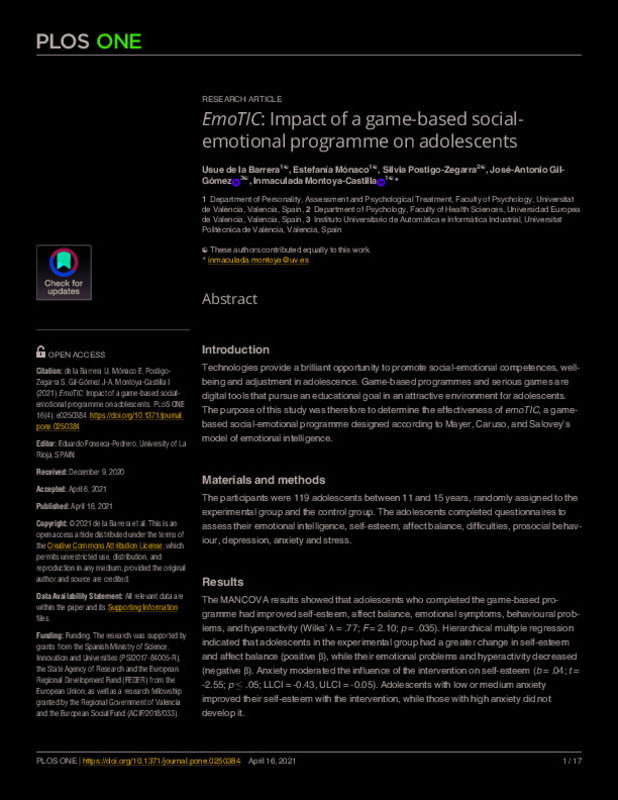JavaScript is disabled for your browser. Some features of this site may not work without it.
Buscar en RiuNet
Listar
Mi cuenta
Estadísticas
Ayuda RiuNet
Admin. UPV
EmoTIC: Impact of a game-based social-emotional programme on adolescents
Mostrar el registro sencillo del ítem
Ficheros en el ítem
| dc.contributor.author | de la Barrera, Usue
|
es_ES |
| dc.contributor.author | Mónaco, Estefanía
|
es_ES |
| dc.contributor.author | Postigo-Zegarra, Silvia
|
es_ES |
| dc.contributor.author | Gil-Gómez, José-Antonio
|
es_ES |
| dc.contributor.author | Montoya-Castilla, Inmaculada
|
es_ES |
| dc.date.accessioned | 2023-05-08T18:02:03Z | |
| dc.date.available | 2023-05-08T18:02:03Z | |
| dc.date.issued | 2021-04-16 | es_ES |
| dc.identifier.issn | 1932-6203 | es_ES |
| dc.identifier.uri | http://hdl.handle.net/10251/193211 | |
| dc.description.abstract | [EN] Introduction Technologies provide a brilliant opportunity to promote social-emotional competences, well-being and adjustment in adolescence. Game-based programmes and serious games are digital tools that pursue an educational goal in an attractive environment for adolescents. The purpose of this study was therefore to determine the effectiveness of emoTIC, a game-based social-emotional programme designed according to Mayer, Caruso, and Salovey's model of emotional intelligence. Materials and methods The participants were 119 adolescents between 11 and 15 years, randomly assigned to the experimental group and the control group. The adolescents completed questionnaires to assess their emotional intelligence, self-esteem, affect balance, difficulties, prosocial behaviour, depression, anxiety and stress. Results The MANCOVA results showed that adolescents who completed the game-based programme had improved self-esteem, affect balance, emotional symptoms, behavioural problems, and hyperactivity (Wilks' lambda = .77; F = 2.10; p = .035). Hierarchical multiple regression indicated that adolescents in the experimental group had a greater change in self-esteem and affect balance (positive beta), while their emotional problems and hyperactivity decreased (negative beta). Anxiety moderated the influence of the intervention on self-esteem (b = .04; t = -2.55; p <= .05; LLCI = -0.43, ULCI = -0.05). Adolescents with low or medium anxiety improved their self-esteem with the intervention, while those with high anxiety did not develop it. Conclusions The use of technology in social-emotional programmes could be the first step in increasing adolescents' interest in emotions and emoTIC could be considered a useful programme which influences their personal, emotional and social factors. | es_ES |
| dc.description.sponsorship | Funding. The research was supported by grants from the Spanish Ministry of Science, Innovation and Universities (PSI2017-84005-R), the State Agency of Research and the European Regional Development Fund (FEDER) from the European Union; as well as a research fellowship granted by the Regional Government of Valencia and the European Social Fund (ACIF/2018/033). The funders had no role in study design, data collection and analysis, decision to publish, or preparation of the manuscript. | es_ES |
| dc.language | Inglés | es_ES |
| dc.publisher | Public Library of Science | es_ES |
| dc.relation.ispartof | PLoS ONE | es_ES |
| dc.rights | Reconocimiento (by) | es_ES |
| dc.subject.classification | LENGUAJES Y SISTEMAS INFORMATICOS | es_ES |
| dc.title | EmoTIC: Impact of a game-based social-emotional programme on adolescents | es_ES |
| dc.type | Artículo | es_ES |
| dc.identifier.doi | 10.1371/journal.pone.0250384 | es_ES |
| dc.relation.projectID | info:eu-repo/grantAgreement/AEI/Plan Estatal de Investigación Científica y Técnica y de Innovación 2013-2016/PSI2017-84005-R/ES/INTERVENCION SOCIO-EMOCIONAL APOYADA EN TICS: DESARROLLO DE LA RESPONSABILIDAD Y EL BIENESTAR EN LA COMUNIDAD EDUCATIVA/ | es_ES |
| dc.relation.projectID | info:eu-repo/grantAgreement/GVA//ACIF%2F2018%2F033/ | es_ES |
| dc.rights.accessRights | Abierto | es_ES |
| dc.contributor.affiliation | Universitat Politècnica de València. Escuela Técnica Superior de Ingenieros Industriales - Escola Tècnica Superior d'Enginyers Industrials | es_ES |
| dc.description.bibliographicCitation | De La Barrera, U.; Mónaco, E.; Postigo-Zegarra, S.; Gil-Gómez, J.; Montoya-Castilla, I. (2021). EmoTIC: Impact of a game-based social-emotional programme on adolescents. PLoS ONE. 16(4):1-17. https://doi.org/10.1371/journal.pone.0250384 | es_ES |
| dc.description.accrualMethod | S | es_ES |
| dc.relation.publisherversion | https://doi.org/10.1371/journal.pone.0250384 | es_ES |
| dc.description.upvformatpinicio | 1 | es_ES |
| dc.description.upvformatpfin | 17 | es_ES |
| dc.type.version | info:eu-repo/semantics/publishedVersion | es_ES |
| dc.description.volume | 16 | es_ES |
| dc.description.issue | 4 | es_ES |
| dc.identifier.pmid | 33861813 | es_ES |
| dc.identifier.pmcid | PMC8051799 | es_ES |
| dc.relation.pasarela | S\435662 | es_ES |
| dc.contributor.funder | European Social Fund | es_ES |
| dc.contributor.funder | Generalitat Valenciana | es_ES |
| dc.contributor.funder | Agencia Estatal de Investigación | es_ES |
| dc.contributor.funder | European Regional Development Fund | es_ES |








